Picture a Uruguayan-American storyteller weaving tales that bridge continents and generations—meet Caro De Robertis! With a flair for poetic prose and a heart for cultural identity, De Robertis burst onto the literary scene with their 2009 debut, The Invisible Mountain, an international bestseller translated into 17 languages. Now a professor at San Francisco State University and a full-time writer in Oakland, California, De Robertis crafts stories that pulse with history, queerness, and resilience, captivating readers worldwide.
The Making of Caro De Robertis
Born in 1975 in England to Uruguayan parents, Caro De Robertis grew up in a family that hopscotched across continents—England, Switzerland, and finally California—following their father’s career as an embryologist. This global upbringing steeped them in Uruguayan culture, sparking a lifelong passion for storytelling. Before writing, De Robertis spent a decade advocating for women’s rights, tackling issues like rape and immigration. Their literary journey began with a Master of Fine Arts from Mills College in 2007, setting the stage for a remarkable career.
Caro De Robertis’s Unforgettable Stories
De Robertis’s novels are a vibrant tapestry of history, identity, and liberation. The Invisible Mountain (2009) traces three generations of Uruguayan women, blending poetic oral history with the nation’s turbulent 20th-century rise and fall. It earned Italy’s Rhegium Julii Prize and became a global sensation. Perla (2012) dives into Argentina’s Dirty War, exploring memory and truth through a young woman’s surreal journey. The Gods of Tango (2015) follows Leda, an Italian immigrant in Buenos Aires, who disguises herself as a man to play tango, winning a Stonewall Book Award for its bold queer narrative. Cantoras (2019), another Stonewall winner, celebrates five lesbian friends defying Uruguay’s 1970s dictatorship, earning praise as a New York Times Editors’ Choice. De Robertis’s prose sings with lush imagery, and their themes—queer identity, immigration, and resistance—resonate deeply.
Beyond novels, De Robertis shines as a translator of Latin American literature, bringing works like Alejandro Zambra’s Bonsai to English readers. They also edited Radical Hope (2017), an anthology of essays by writers like Junot Díaz, blending love and dissent. Their upcoming nonfiction, So Many Stars (2025), amplifies queer and trans BIPOC voices, cementing their role as a cultural bridge-builder.
Why Caro De Robertis Matters
De Robertis’s work transcends borders, giving voice to marginalized stories—queer, immigrant, Latinx—with unflinching honesty and beauty. Their novels don’t just entertain; they challenge readers to confront history’s shadows and celebrate human resilience. Honors like the National Endowment for the Arts Fellowship and the 2022 Dos Passos Prize, which De Robertis was the first openly nonbinary person to receive, underscore their influence. By teaching at San Francisco State and sharing oral histories of queer BIPOC elders, they shape the future of literature and activism.
- Born: 1975, England
- Key Works: The Invisible Mountain, Cantoras, The Gods of Tango, Perla
- Awards: Stonewall Book Awards, Rhegium Julii Prize, Dos Passos Prize
- Fun Fact: De Robertis identifies as queer and genderqueer, using they/them pronouns.
Snag Cantoras or The Invisible Mountain and dive into Caro De Robertis’s world of lyrical, boundary-breaking stories!








